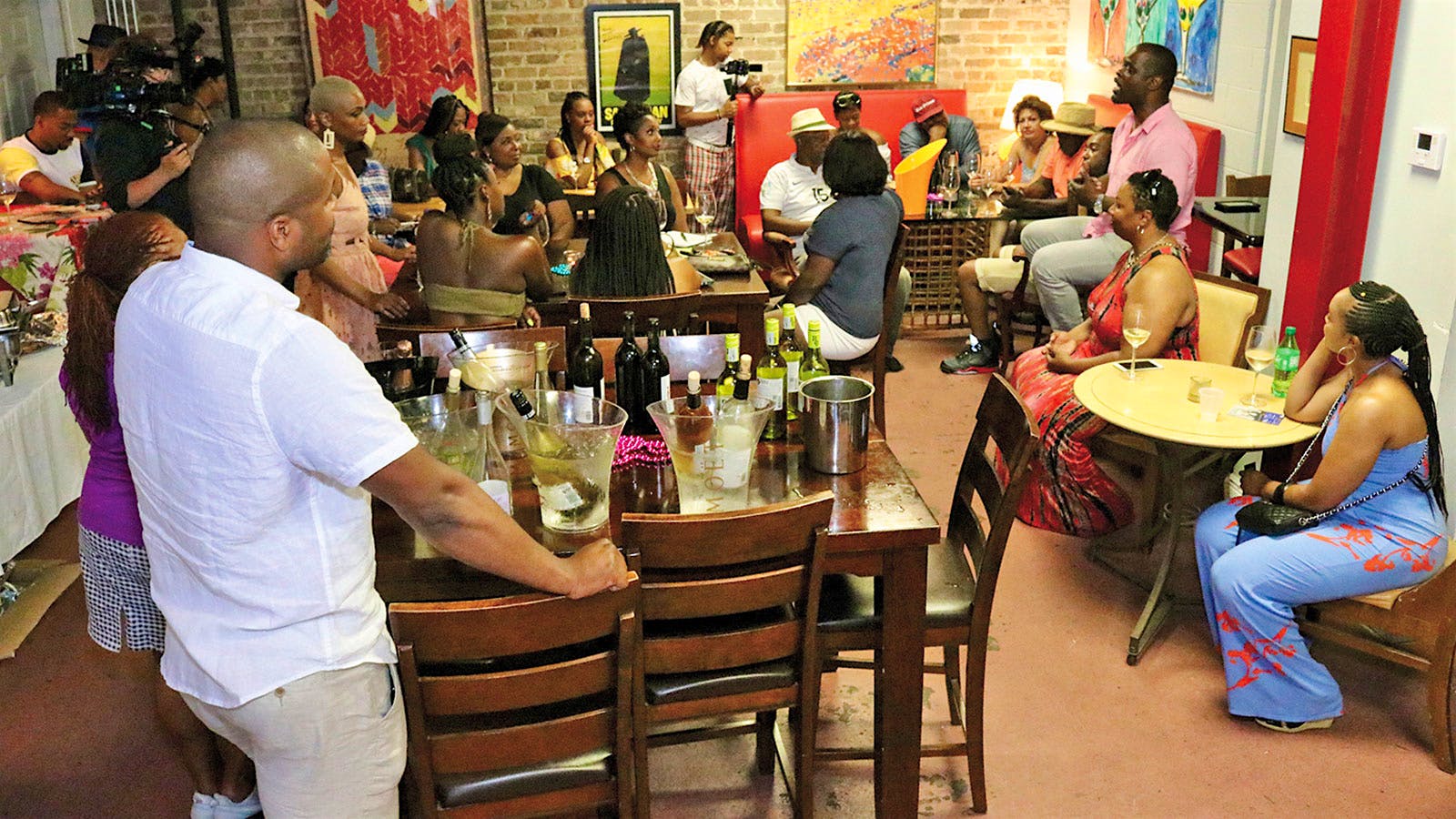CONSUMERS
The Hue Society
thehuesociety.com
The Hue Society curates experiences for Black wine lovers to congregate with a backdrop of Black music, art and culture. Founder Tahiirah Habibi, originally from Philadelphia, found her footing as a sommelier in Miami, working at the St. Regis Bal Harbour and Michael’s Genuine, a Wine Spectator Award of Excellence winner. But amid the fine dining and geeky wine discussions about soils, Habibi describes feeling alienated and forced to code-switch or assimilate when it came to wine.
She started creating events that she wanted to attend, like the Black Wine Experience in New Orleans. “I didn’t set any rules like you have to dress this way, you have to talk this way. I took wine to the culture instead of trying to bring the culture into a wine space.”
Habibi launched the Hue Society in 2017, inspired by the Jay-Z lyrics, “What’s better than one billionaire? Two. ’Specially if they’re the same hue as you.” Now based in Atlanta, Habibi is launching chapters digitally, starting with New York and Atlanta, bringing together a multicultural mix of wine professionals and wine lovers to learn and share monthly virtual tastings led by mentors.
EDUCATION
Wine Unify
wineunify.org
A nonprofit founded by industry veterans DLynn Proctor, Martin Reyes and Mary Margaret McCamic, Wine Unify looks to increase diversity through education. Reyes, the first Mexican American Master of Wine, calls education “a solvent against the stubborn crust of preconception that brown and Black people don’t know wine, or don’t ‘look the part’ of a wine-savvy consumer or expert.”
The initiatives center on the Wine & Spirit Education Trust (WSET), which offers globally recognized wine qualifications. McCamic, who holds a Master of Education as well as a Master of Wine, explains, “We want to give people a credential they can put on their résumé and it [means] something no matter where they go in the world.”
Wine Unify offers awards at the “Welcome” level, covering tuition for WSET Level 1 at Napa Valley Wine Academy, a tasting kit with wine samples for the course, and access to a mentorship team that includes Tonya Pitts, Annette Alvarez-Peters and Julia Coney. “Elevate” awards include tuition for Level 2 or $1,000 toward WSET or Master of Wine tuition, wines, a Coravin system and more. The “Amplify” initiative is what Proctor, director of Fantesca Estate & Winery in Napa, calls the “additional step” to feel welcomed by the community, strengthening visibility through networking.
The Roots Fund
therootsfund.org
The Hue Society founder Tahiirah Habibi, Heitz Cellar president and CEO Carlton McCoy Jr. and hospitality specialist Ikimi Dubose have launched the nonprofit The Roots Fund. There are plans for 20 scholarships for Black, indigenous and Latinx people to attend enology/viticulture programs and wine schools, plus travel funds for internships and financial support for a WSET or Court of Master Sommeliers exam.
The Rooted in France scholarship, a partnership with Domaine Dujac and the Burgundy School of Business, will provide a bachelor's degree graduate of a historically black college or university the opportunity to live and work in Dijon, France, while earning a master's degree at the School of Wine & Spirits Business. Applications open in January 2021.
PROFESSIONAL CONNECTIONS
Black Wine Professionals
blackwineprofessionals.com
When the conversation about a lack of diversity in the wine industry moved to the forefront this summer, lists of Black-owned wineries and Black-made wines began to circulate. Wine writer and educator Julia Coney went a step further, creating a database of Black contributors in the wine industry.
Coney’s hope is that employers and gatekeepers will refer to the list as they look to be more inclusive. “What’s missing from the conversation is, what haven’t wineries done, and what they can do to be better,” she says.
Coney’s brainchild, the Black Wine Professionals organization, counted 150 members at press time, with 400 on the waitlist for participation, including importers, directors, buyers, retailers, speakers, sommeliers, educators, podcasters and consultants. Recently, the outreach has expanded to include classes, with hopes of soon branching further to event listings, job postings and other resources.
BWP has partnered with Champagne Laurent-Perrier USA to provide five scholarships for its members (blackwineprofessionals.com/scholarships) to the Wine Scholar Guild’s Champagne Master-Level certification.
SUPPORT FOR WINEMAKERS AND VINTNERS
Association of African American Vintners
aaavintners.org
In 2002, vintner Mac McDonald realized there weren’t many people that looked like him at wine tastings, so he introduced himself to the two other African American winemakers in the room—Dr. Ernie Bates of Black Coyote Winery and Vance Sharp of Sharp Cellars.
From their conversations, the nonprofit Association of African American Vintners (AAAV) was formed as a way to get more African Americans to drink wine, and to help them enter and feel welcome in the industry. (Read our full story about the organization.)
Through the years, AAAV has sponsored events, internships and mentorships, and now it is broadening its scope beyond just winemakers; membership now includes négociants, friends and students. Membership at press time was at 60 and growing. The AAAV website also now includes an online store to sell members’ wines—a one-stop shop for wines made by African Americans.
Urban Connoisseurs
urbanconnoisseurs.com
There has been no single path for Urban Connoisseurs founder Marcia Jones. Since the [organization’s] 2012 launch, Jones has multitasked to effect sustainable growth among American winemakers of African descent. She notes that their minimal representation and the industry’s often barely veiled bias makes developing relationships to move wines through distribution channels more difficult.
She started with a wine club, moved to sales and marketing, and has been a public speaker, scholarship founder and vintner. Currently, Jones is working on a film, Journey Between the Vines: The Black Winemakers’ Story, and an as-yet-untitled book about the history of Black winemakers and winery owners in the U.S. (Read our full interview with Jones about her projects.
Jones challenges people to question their biases, and believes the wine industry can become more diverse, but says, “Don’t change just because of the climate.”
The Black Winemakers Scholarship Fund
urbanconnoisseurs.com/scholarship.html
Founded through a partnership of Urban Connoisseurs, the Association of African American Vintners and the United Negro College Fund, the Black Winemakers Scholarship Fund helps students pursuing degrees in viticulture or enology. At press time, the fund had raised $25,000 and plans to disburse $5,000 scholarships.
IMPORTERS & DISTRIBUTORS
The Wine Noire
thewinenoire.com
In 2017, when Alicia Maria Kidd founded Wine Noire in Berkeley, Calif., she became an importer, exporter and retailer for underrepresented companies, creating her own mini supply chain to help people of color get their wines to market. Her focus is on South African wines and on Latinx- and Black-owned wineries in California.
Kidd previously worked in corporate America. She saw minority-owned wineries struggling to get distribution. Now she is assisting with logistics for representing these wines. “I’m not an influencer; I’m not a somm,” she says. “I’m not someone that came in the industry owning my own company or my own commerce, so I have a different perspective that I think people need to look at.”
Up next? A wineshop and tapas joint to open next year in Oakland.
Southern Glazer’s Wine & Spirits
southernglazers.com
Southern Glazer’s is the largest wine and spirits distributor in the U.S. The company recently made a grant to the Equal Justice Initiative, partnered with the Black Hospitality Initiative, and donated $1 million to the Thurgood Marshall College Fund. It’s also expanding efforts to support minority-owned brands in its portfolio and to promote inclusion within its own ranks.
“Diverse organizations win,” says senior vice president Terry Arnold, pointing to evidence of their greater growth and innovation. “Diversity means gender, ethnicity, life experience, work experience and education.” Arnold believes a company’s overall happiness index goes up as more employees of diverse backgrounds feel valued and challenged.
WINERIES
E. & J. Gallo
gallo.com
Stephanie Gallo, chief marketing officer, says the winery’s diversity initiatives follow in the company’s founding spirit that wine should be accessible for all.
Gallo’s Employee Resource Groups (ERG) each support a different segment of the team, including women, Latinx, Asians, LGBTQ+ and others. The Gallo African American Network, like all the ERGs, provides support, development and outreach through events, campaigns and town halls.
Among other efforts, Gallo’s Barefoot brand has launched the #WeStanForHer campaign, donating $82,500 to the New Voices Foundation, a nonprofit dedicated to the advancement of women of color entrepreneurs.
Gallo points to the business sense of these efforts, as well as their moral value. “The multicultural consumer will be a ‘majority’ minority by 2040.”
Klinker Brick
klinkerbrick.com
This Lodi, Calif., winery looks to its own company DNA as a model of industry inclusivity. Women head the winery: owner Farrah Felten-Jolley and sales director Elizabeth Barnard. Winemaker Joseph Smith hails from Belize; assistant winemaker Christopher Rivera is the son of Mexican immigrants.
Tasting rooms are staffed and trained with diversity in mind. Visitors of color are assumed to be savvy wine lovers. Plans include a program to expose local students to wine’s many career options. Rivera and Smith connect to their own cultures through wine: Rivera’s Seis Soles label embraces his Mexican heritage; Smith started a distribution company in Belize.
“We need to show more representation at the winery level, the distributor level, the restaurant level, the media level,” says Barnard.




















